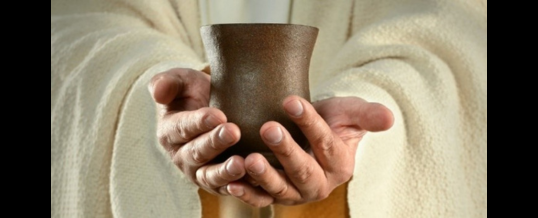
A couple of weeks ago, our bishop, Archbishop Guy Desrochers, granted permission for us to reinstate sharing in the Blood of Christ at Mass. That was welcomed news to many who have been longing to drink from the Cup for the past four years, but because of Covid-19 were not able to. Through nobody’s fault, but through an abundance of caution, we were not able to fulfill Jesus’ command at the Last Supper when he said, “Do this in memory of me.” Jesus thought it was so important that he turned sharing in the Cup into a command.
The Cup, like any symbol in the Church, is large enough that it can hold together opposites. The Cup is the Cup of suffering. It is also the Cup of celebration. As you hold the Cup in your hands, can you hold suffering and celebration together?
When the Apostles James and John, under the coercion of their mother (Big Mama Zebedee, a force to be reckoned with), asked if Jesus could reserve them seats at his right and left in the kingdom, Jesus was quick to ask, “Can you drink the Cup I am going to drink?” (Mt. 20:22). This is the Cup of suffering. In other words, “Are you willing to suffer with me?”
Although we have been without the Cup for four years, I have seen many people embrace the Cup of suffering in their lives. Standing by a spouse, who is all but lost because of dementia is willingness to drink the Cup. Having to accept your own health or that of a loved one diminish without remedy is willingness to drink the Cup. Watching a marriage fall apart and feeling helpless but to accept it is willingness to drink the Cup. Struggling to put food on the table and pay the rent each month is willingness to drink the Cup.
Jesus himself had his share of suffering long before the ultimate suffering of the crucifixion. While in the Garden of Gethsemane the night before his death, Jesus deals with his own Cup. “My Father,” he said, “if it is possible, let this Cup pass me by. Nevertheless, not what I want, but what you want” (Mt. 26:42).
Henri Nouwen wrote in his book, Can You Drink the Cup?, the following: “Jesus didn’t throw the Cup away in despair. No, he kept it in his hands, willing to drink it to the dregs. This was not a show of willpower, staunch determination, or great heroism. This was a deep spiritual yes to Abba, the lover of his wounded heart” (p. 37).
Unfortunately, even before Covid-19, some people were not able to share in the Cup for medical reasons or because they were struggling with alcoholism. I feel for people in these situations; their desire is greater than their ability. Other people simply walk by the Cup with little regard. Perhaps these people have never heard the words of St. Peter who tells us, “You were ransomed from your futile ways inherited from your ancestors, not with perishable things like silver or gold, but with the precious blood of Christ, like that of a lamb without defect or blemish” (1 Pet. 1:18).
Always take seriously the commands of Jesus. He made receiving his Blood a command and tied it to memory—“Do this in memory of me.” The implication being that if we don’t share in his Cup, it won’t be long before we forget him altogether.
Returning to Henri Nouwen, I quote from Can You Drink this Cup?: So often we are inclined to keep our lives hidden. Shame and guilt prevent us from letting others know what we are living. We think: “If my family and friends knew the dark cravings of my heart and my strange mental wanderings, they would push me away and exclude me from their company.” But the opposite is true. When we dare to lift our cup and let our friends know what is in it, they will be encouraged to lift their cups and share with us their own anxiously hidden secrets. The greatest healing often takes place when we no longer feel isolated by our shame and guilt and discover that others often feel what we feel and think what we think and have the fears, apprehensions, and preoccupations we have (p. 59).
If you have never received from the Cup, consider this: It costs us nothing to receive it; it cost Jesus everything to give it.
Fr. Phil
JUN
2024

About the Author: